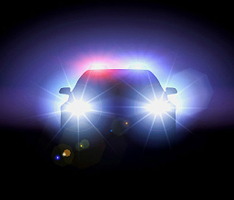
— Do you flash your headlights to warn drivers of a speed trap? Have you been careful to make sure no cops are around to see it, thinking you might be busted if caught?
Two recent legal cases have tackled that very issue of warning drivers about speed traps, and both outcomes were not in favor of law enforcement agencies.
The "Holding Warning Signs" Case in Texas
One case in Texas involved Ron Martin, 33, who was arrested after holding signs in the center median of traffic warning drivers of police radar. Martin was cited for holding or wearing a sign for advertising, a charge he fought based on the fact he wasn't advertising anything.
A municipal judge agreed and dismissed the charges, saying that although the city had an ordinance against human signs, the judge couldn't figure out which part of the ordinance was violated.
The "Flashing Lights" Case in Missouri
A separate case in Missouri is more important because a federal judge ruled that flashing your lights to warn drivers is protected under the First Amendment.
In 2012, Michael Elli flashed his headlights to warn vehicles of police radar in the town of Ellisville, Mo. An officer saw it and ticketed Elli, who faced a $1000 fine plus points on his license. After Elli appeared in municipal court to plead not guilty, the city dropped the charges, but the American Civil Liberties Union sued the city on Elli's behalf.
Ellisville officials defended the ordinance by saying that flashing headlights could interfere with a police investigation.
However, U.S. District Judge Henry E. Autrey, in St. Louis, disagreed with the city and ruled the flashing of headlights:
"...sends a message to bring one's driving in conformity with the law - whether it be by slowing down, turning on one's own headlamps at dusk or in the rain, or proceeding with caution."
Autrey said in the ruling that even if a driver sends a message that an oncoming driver should slow down because a speed trap is ahead, there is nothing illegal about doing that.
The city of Ellisville now has changed their policy and is refusing to issue more tickets under the ordinance, but a driver could still be ticketed under a similar state law.
"The expressive conduct at issue sends a message to bring one's driving in conformity with the law - whether it be by slowing down, turning on one's own headlamps at dusk or in the rain, or proceeding with caution," "Missouri (but not Ellisville) makes it 'the crime of hindering prosecution if for the purpose of preventing the apprehension, prosecution, conviction or punishment of another for conduct constituting a crime he ... [w]arns such person of impending discovery or apprehension, except this does not apply to a warning given in connection with an effort to bring another into compliance with the law[.]'" - U.S. District Judge Henry E. Autrey




